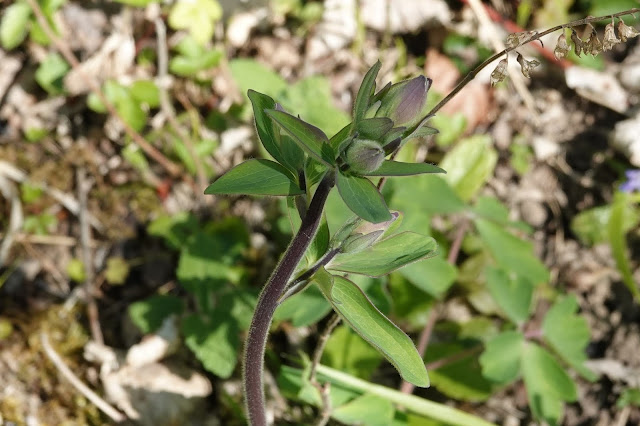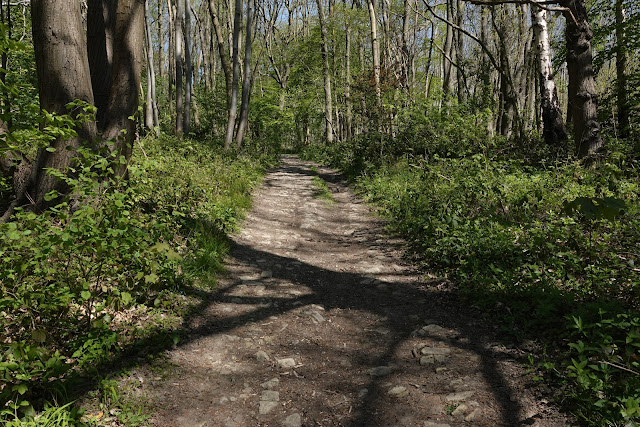A fairly late start saw me head south once again with the
intent of getting to those woods that I saw above the Hallings on Monday.
It is roadway all the way to Cuxton and the traffic was the
heaviest I have seen in weeks but I still managed to hear the lovely calls of
14 Med Gulls drifting on snow white wings onto the breeze down river.
My access point was actually behind St Michael & All
Angels church in Cuxton although no path is signed off the road until you
actually find the gate which led me up through a magnificent Buttercup strewn
meadow with expansive views down over the Medway towards Woudlham and beyond.
 |
| Upriver |
 |
| Downriver |
 |
| Inland to Ranscombe and Cobham Woods |
 |
| Buttercups |
 |
| Cut Leaved Cranesbill |
 |
| Cow Parsley |
 |
| Goldfinch |
 |
| Another path tunnel... |
 |
| First Oak Eggar of the year |
Whitethroats accompanied me up towards the wood where it
soon joined the main North Downs Way which was the path I was after through
Wingate Wood. I followed this south west
along the ridge line through a mix of unmanaged Chestnut coppice with huge
standard Oak, Beech and Hornbeam strewn amongst them, with Whitebeam and
ancient twisted Yews on the eastern down slope towards the old chalk quarry
faces that you can see from the road.
 |
| A little overdue a haircut |
 |
| Yews |
The woods were a carpet of Bluebells once
again and you could smell them in the warming sunshine that was filtering
through and mixed with them I could taste Garlic on the air so I was confident
that I was about to discover my first patches of Ramsons.
The Ramsons did not take too long to locate and the fresh green leaves were
particularly pungent. There is a
hoverfly that lives on this plant but there was very little flower and I had no
joy. There were patches of Wood Anemone,
Celandines and Violets and flowering Woodruff and Sanicle were both new ‘walk
species’.
 |
| Ramsons |
 |
| Ramsons |
 |
| Sanicle, Woodruff, Bugle and Wood Anemones |
 |
| Woodruff |
 |
| Sanicle |
 |
| Sanicle |
 |
| Violet |
Two recently emerged Grey Squirrels played in a gnarly Oak
and I suspect it is actually the first time I have seen young of this
species. They were incredibly cute.
 |
| Grey Squirrellets |
 |
| Grey Squirrellet |
One of the reasons I was keen to get up here was to listen
for Firecrests in the Yews but I had no joy at this point but the other
potential find up here was Hawfinch and I thought my chances incredibly slim but
much to my delight I found a pair in the first Yews I came to. They were flighty and the singing male seemed
to be following the second bird around.
Nuthatches and Treecreepers were singing and I also heard Green
and Great Spotted Woodpeckers but like most woodland you hear more than you
ever see.
There is something beautifully sentient about an old
woodland. I love to actually touch the biggest trees that have stood there so
long and experienced so much. I will pat a trunk or momentarily lay my hand on
it and say hello as I pass by. From the smooth flaky surface of a contorted Yew;
the shiny smoothness of a Beech or the ridged twisted helix of a venerable
Sweet Chestnut; they are all different and special. I have this strange notion about paying my
respects to trees; I do not know where this comes from (probably my Dad) but I
find it calming and appropriate.
 |
| Yew |
 |
| Yew |
 |
| Sweet Chestnut |
I had the place to myself as I crossed under the main pylon
line and into Horseholders Wood. There was
another dazzling Bluebell display here and the bonus of two more pair of
Hawfinches with both males singing and chasing respective partners around the
Hornbeams.
 |
| This Acer is clearly not Sycamore - Norwegian Maple? |
At this point I was above Upper Halling and turned north
west at a major crossroads and struck out towards Luddesdown. The path quickly took me to a clear felled area
of Chestnut, probably about two years old with sentinel Oaks and Hornbeams
standing in the open for the first time in a generation looking at some of the
girth of felled timber.
 |
| Danger of Death from assault by a giant licorice stick while inside a Snooker Triangle |
I stood and listened in the hope of a Tree Pipit and got a
mewing Buzzard for my troubles.
From here the path dropped into another valley,
through regenerated Chestnut and Hazel coppice, Birch and Dogwood.
Two pair of Bullfinches were encountered along with more Nuthatches. The
landowners here really want you to stay on the path – every ride had a private
sign and numerous Pheasant hoppers.
There were plenty of Primroses still in flower and I found Aquilegia
and Yellow Pimpernel as well as three Common Lizards that gave themselves away
with their leaf litter rustling.
 |
| Primroses |
 |
| Aquilegia
|
 |
| Yellow Pimpernel |
 |
| Common Lizard |
 |
| Male Fern |
I was trying to find the bridlepath that would take me back
to Bush Road and despite no signage I found the right track and started back up
through Red Wood following my nose more than anything else. A stately Beech
bore the marks of successive visits and I would not be surprised if this was
linked in with the landowner’s family as I suspect very few people get onto
these side paths other than those working the forest for timber and game. The first date is 1930, then 1948, 1957 and
1979 and so on. I went up to the tree and apologised for its defacement. The
bark was cold despite the sunshine.
A little way on from this I found another stand of Yew and at
last my hoped for Firecrest. I suspect
that the woods have far more than this. The ride became more sunlit and Early Purple
Orchids appeared on the edges amongst the Bluebells and Brimstones, Orange Tips
and diminutive Grizzled Skippers danced between blooms.
 |
| Early Purple
Orchid |
 |
| Grizzled Skipper |
 |
| Grizzled Skipper |
 |
| Grizzled Skipper |
 |
| Brimstone |
 |
| Orange Tip |
I could see the road below me but on coming to an area of
new clear fell I found my path blocked by dozens of felled trees. I found two groups of chainsaw gear but no
workers so pushed my way into the wood and fought my way alongside the
bridlepath to the woodland edge and across the field to the road where I was
greeted by a stunning Red Kite flying straight at me!
 |
| The face of mechanical forestry |
 |
| Red Kite |
 |
| Speedwell |
From here it was straight back onto a footpath and up
through the Ranscombe chalk meadows to regain the main path into Cobham Woods
and home. There were lots of butterflies
in the margins with Peacock, Red Admiral, Comma and Small Tortoiseshell and I
was very pleased to find a single Small Heath and several dinky Dingy Skippers
on the wing.
A heavily scented Lilac just into the wood added Small and
Large White to the list and Speckled Woods twirled over the ride.
 |
| Brimstone |
 |
| Small Heath |
 |
| Dingy Skipper |
 |
| Tunnel under the railway |
 |
| male Kestrel |
 |
| Small White |
I took the
cobbled path up into the trees wondering if it was an old drovers road south
west out of the Medway towns before veering off again to the Darnley Mausoleum
and the huge twisted Sweet Chestnuts that I have encountered before.
 |
| The cobbled way |
 |
| Darnley Mausoleum |
 |
| This Chestnut looks like it has the skull of some long extinct tusked beast encased within it |
 |
| Deceased |
 |
| male Great Spotted Woodpecker |
There was no sign of the Highland Cattle but they were
nearby as the local fly population was attracted to some nice fresh wet
pats! Yellow Dung Flies did the dance of
love, tripping the shite fantastic in their search for unsuspecting females and
lunch and were joined by Musca autumnalis,
Mesembrina meridiana and another
lover of fresh dung, Eudasyphora cyanella
which sort of looks like something between a Green and Bluebottle and I thank
Phil C as usual for his prompt id that evening.
 |
| Parrrrtyyyy! |
 |
Dung Fly orgy - Eudasyphora cyanella pretends not to notice all the gratuitous sex going on while she has her dinner
|
 |
Eudasyphora cyanella and Musca autumnalis above
|
 |
| Eudasyphora cyanella |
 |
| Mesembrina meridiana |
I sauntered back along the main ride with Peacocks sunning
on the path and the first St Mark’s Flies dancing around the Alexanders as I
got back to the Eurostar tunnel.
 |
| St Mark’s Flies making more... |
Even the last stretch back down my road to home added two
more butterfly species with Green Veined Whites on the verge Dandelions and Scarlet Pimpernel and a
gleaming Holly Blue taking me to a very impressive 15 species for the day and
the Firecrest and Hawfinch to 100 bird species from home and my walkabouts since the 23rd
March.
 |
| Scarlet Pimpernel |














































































I have a mental image of you standing poring over a 1:25000 OS map trying to work out your route. I hope I'm right and you didn't just follow your nose!!
ReplyDeleteMy nose is actually highly trained but you wil be pleased to know that I did indeed have an OS map and Google maps top assist when my nose was running
ReplyDelete